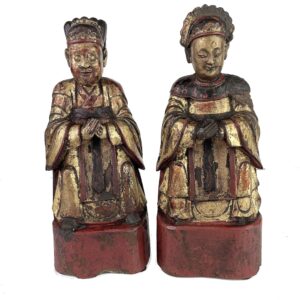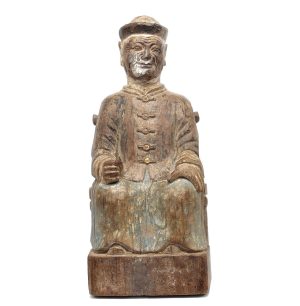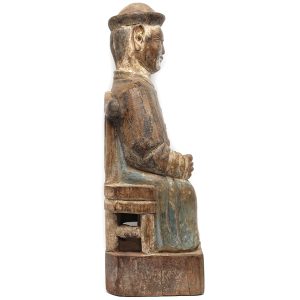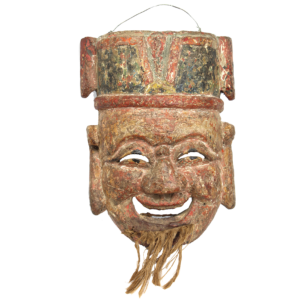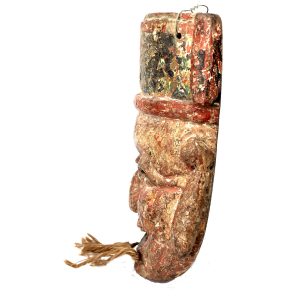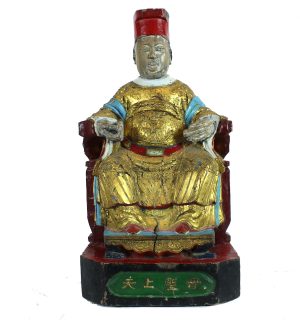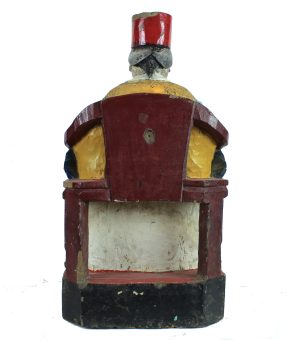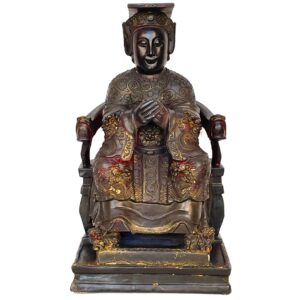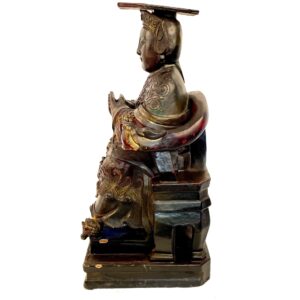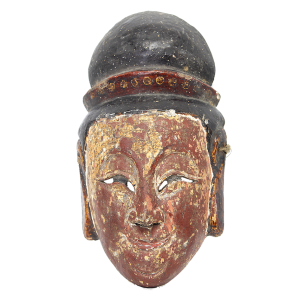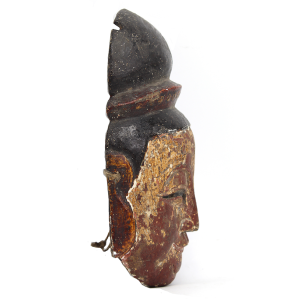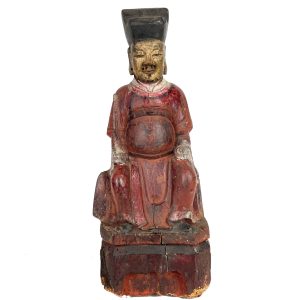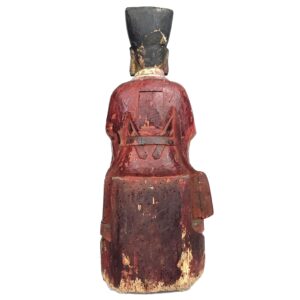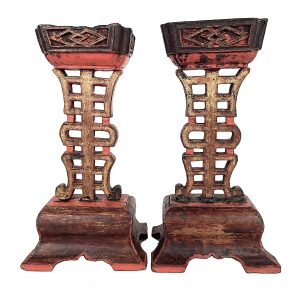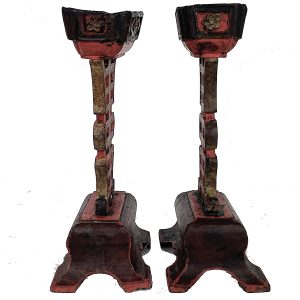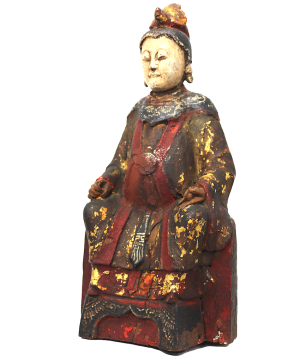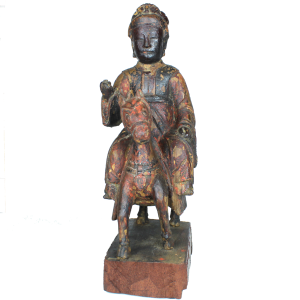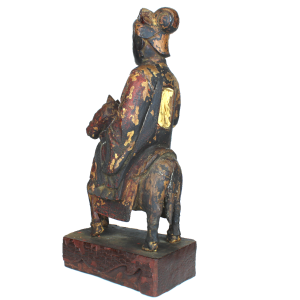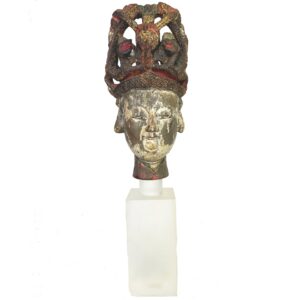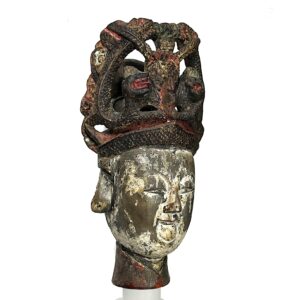Showing 25–36 of 69 results
-
Sale!


$785.00 Original price was: $785.00.$650.00Current price is: $650.00.
H: 7.75″ W: 3.25″ D: 2.375″ | free shipping within Continental U.S.
Finely carved this Kitchen God and his Wife monitor family members from their perch above the stove. Near mirror images with layered gold officials’ robes they symbolically hold tablets to report about the family to the Jade Emperor on Chinese New Year. enhance feng shui. Kitchen Gods especially pairs are now rare and very collectible and make unique wedding and house gifts.
-
Sale!


$595.00 Original price was: $595.00.$485.00Current price is: $485.00.
H: 11.5″ W: 5″ D: 4″ | FREE SHIPPING WITHIN CONTINENTAL U.S.
The finely carved ancestor figure in traditional Qing dynasty high neck Mandarin official’s long jacket with front buttons and official rattan woven headwear. The chair’s back slat was omitted as back carved cavity for consecration in an eye-opening ceremony
-
Sale!


$595.00 Original price was: $595.00.$475.00Current price is: $475.00.
H: 10.5” W:7.75” D: 3” | FREE SHIPPING WITHIN CONTINENTAL US
This antique Nuo Opera mask is Tudi Gong, benevolent Earth god with smiling animated face, long eyebrows, hemp beard and high decorative hat. With an honest gentle disposition, he symbolizing the power of good to defeat evil. Nuo popular in Ming/ Qing dynasties, there are few remaining troupes.
-
Sale!


$1,150.00 Original price was: $1,150.00.$875.00Current price is: $875.00.
H: 19.25″ W: 10″ D: 8.75″ |CALL 213-568-3030 OR EMAIL [email protected] FOR SHIPPING.
Seated imperiously on a horseshoe chair with carved title “Holy Mother in Heaven,” Mazu is depicted in the imperial style, with a regal flat topped headdress, elaborate robes with dragons, official’s girdle in red and gilt.
-
Sale!


$1,050.00 Original price was: $1,050.00.$650.00Current price is: $650.00.
H: 15.375” W: 8.625” D: 7.5” | CONTACT US AT 213-568-3030 or email [email protected] for SHIPPING.
Mazu, protector of sea, is portrayed as the imperially sanctioned “Empress of Heaven” on an elaborate, horseshoe shaped dragon throne, holding a hu tablet, with elegant dragon robes, official’s girdle, Empress headdress and small feet on gilt fu lion foot rest.
-
Sale!


$395.00 Original price was: $395.00.$325.00Current price is: $325.00.
H: 9.25″ W: 5.75″ D: 2.25″ | FREE SHIPPING WITHIN CONTINENTAL U.S.
Chinese Noa opera mask is likely a female zhengshen – a benevolent gods with kind and honest nature and gentle disposition -symbolizing the power of good to defeat evil. Age and heavy use
-
Sale!


$875.00 Original price was: $875.00.$495.00Current price is: $495.00.
H: 15.5″ W: 6.125 ” 4.125 D: ” | FREE SHIPPING WITHIN CONTINENTAL U.S.
Carved ancestor figure as an official sits on a backless chair with a decorative pedestal in official’s attire holding a long slender curved hu-tablet, all signs of his office and status. He is vibrantly painted in red, the color of fu, as a wish for prosperity and status.
-
Sale!


$295.00 Original price was: $295.00.$165.00Current price is: $165.00.
H:9.25 ” W: 5.25 ” D: 3.5 ” | CALL 213-568-3030 OR EMAIL [email protected] FOR SHIPPING.
Pair of oil lamps for good fortune with diamond shaped double lozenge meaning many treasures, and plum blossoms, symboling the Five Happinesses – wealth, health, longevity, peaceful death and love of virtue.
-
Sale!


$525.00 Original price was: $525.00.$495.00Current price is: $495.00.
H: 7.75” W: 3.5″ D: 3.5″ | FREE SHIPPING within continental U.S.
Rare and charming carved attendant pair to flank deities on circular pedestals presenting boxed offerings with ribbons as wish for longevity.
-
Sale!


$585.00 Original price was: $585.00.$395.00Current price is: $395.00.
H: 11.5″ W: 5.3″ D: 4.2″ | FREE SHIPPING WITHIN CONTINENTAL U.S.
Provincial carving with iconic phoenix headdress, hands in karana mudra to cast out demons, negative energy and purify spaces. Image was on home altar and consecrated with a sealed cover.
-
Sale!


$625.00 Original price was: $625.00.$495.00Current price is: $495.00.
H: 14.75″ W: 5.25″ D: 6.8″ | FREE SHIPPING WITHIN CONTINENTAL U.S.
By making the Queen Mother larger than her horse and adorning it with decorative accessories – wide blanket, prominent head gear, double rowed harness, decorative medallion – this provincial artist emphasizes her power as Tao goddess of life, fertility and granting immortality.
-
Sale!


$785.00 Original price was: $785.00.$495.00Current price is: $495.00.
Ht: 17” W: 4.25” D: 4.5” | FREE SHIPPING WITHIN CONTINENTAL U.S.
Very rare depiction of Queen Mother of the West puppet head wearing elaborate headdress with outstretched tortoise legs atop a phoenix, reflecting early shamanism rites of turtle shell divination. Mounted on acrylic base.
End of content
End of content

